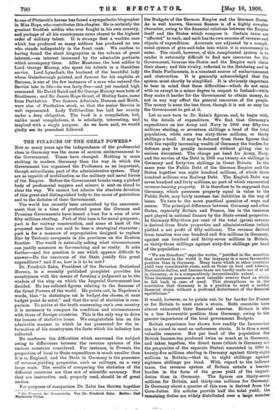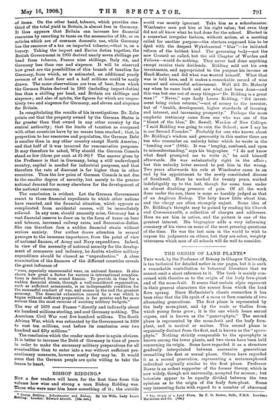THE FINANCES OF THE GREAT POWERS.* NOT so many years
ago the independence of the professorial class in Germany was the cause of serious embarrassment to the Government. Times have changed. Nothing is more striking in modern Germany than the way in which the Government has organised the Professors as an important, though subordinate, part of the administrative system. They are as capable of mobilisation as the military and naval forces of the Empire. Before the Government breaks camp a picked body of professorial sappers and miners is sent on ahead to clear the way. We cannot but admire the absolute devotion of this great and distinguished body to the cause of patriotism and to the dictates of their Government.
The world has recently been astonished by the announce- ment that in a time of profound peace the German and Prussian Governments have issued a loan for a sum of over fifty millions sterling. Part of this loan is for naval purposes ; part is for railway construction, and some at least of the proposed new lines are said to bear a strategical character ; part is for a measure of expropriation designed to replace Slav by Teutonic occupants in the provinces on the Eastern frontier. The world is naturally asking what circumstances can justify measures so far-reaching and so costly. It asks further—and the question is one which appears difficult to answer—Do the resources of the State justify this great expenditure and if so, how is it to be met ?
Dr. Friedrich Zahn, President of the Bavarian Statistical Bureau, in a recently published pamphlet provides his countrymen with the means of forming a judgment as to the wisdom of the step on which the Imperial Government has decided. He has collated figures relating to the finances of the Great Powers of the world. He points out, in Napoleon's words, that " la statistique est le budget des choses, et sans budget point de salut," and that the soul of statistics is com- parison. To arrive at the truth concerning one's own country it is necessary to compare its condition and circumstances with those of foreign countries. This is the only way to drive the lessons of statistics home. We congratulate him on the admirable manner in which he has presented for the in- formation of his countrymen the facts which his industry has collected.
He confesses the difficulties which surround the subject owing to differences between the revenue systems of the various countries considered. For instance, in Prussia the proportion of local to State expenditure is much smaller than it is in England, and the State in Germany is the possessor of revenue-yielding properties, such as railways, on a very large scale. The results of comparing the statistics of the different countries are thus not of scientific accuracy. But they are instructive, and, properly used, should be of great service.
For purposes of comparison Dr. Zahn has thrown together
• Die Finanten der Grossmdchte. Von Dr. Friedrich Zahn. Berlin Carl Heymann Verlag.
the Budgets of the German Empire and the German States. As is well known, German finance is of a highly complex character, owing to the financial relations between the Empire itself and the States which compose it. Certain taxes are "affected" to each, and each has its own sources of revenue and objects of expenditure. Accounts are adjusted by a compli- cated system of give-and-take into which it is unnecessary to enter. The result, however, of this complicated system is to render it extremely difficult to find new resources for the Government, because the States and the Empire each claim their share; and this rivalry, reflected in the Reichstag and in the State Parliaments, is a constant source of embarrassment and obstruction. It is generally acknowledged that the system must shortly be simplified. It is obviously important to bear in mind that these difficulties—which do not exist with us except in a minor degree in respect to Ireland—while they make it harder for the Government to obtain money, do not in any way affect the general resources of the people. The money is none the less there, though it is not so easy for the Government to get at it.
Let us now turn to Dr. Zahn's figures, and, to begin with, to the details of expenditure. We find that Germany's expenditure on her Army and Navy in 1906 was fifty-two millions sterling, or seventeen shillings a head of the total population, while ours was sixty-three millions, or thirty shillings a head. It may be deduced from these figures that with the rapidly increasing wealth of Germany the burden for defence may be greatly increased without giving rise to serious discontent. The charge per head for Army, Navy, and the service of the Debt in 1906 was twenty-six shillings in Germany and forty-two shillings in Great Britain. In the same year the Public Debt of the German Empire and the States together was eight hundred millions, of which three hundred millions was Railway Debt. The English Debt was seven hundred and forty millions, no part of which represented revenue-bearing property. It is therefore to be supposed that Germany, which possesses property equal in value to the Public Debt, may fairly increase her liabilities in the way of loans. To turn to the more practical question of ways and means. The principal difference between Germany and other States, especially Britain and France, lies in the immense part played in national finance by the State-owned properties.
In Germany fifty-three per cent. of the total (gross) revenue is derived from State properties and administrations (which yielded a net profit of fifty millions). The revenue derived
from taxation was one hundred and five millions in Germany, against one hundred and thirty-seven millions in Britain, or thirty-three shillings against sixty-five shillings per head of the population :- " We are therefore," says the writer, " justified in the assertion that nowhere in the world is the taxpayer in a more favourable position than in Germany. Many taxes which in other countries yield very considerable sums, such as those on beer and tobacco, Succession-duties, and Income-taxes are hardly made use of at all in Germany, or to a comparatively inconsiderable extent Thus Germany possesses a most valuable reserve fund on which to fall back in case of need. This strengthens us in the conviction that Germany is in a position to meet a sudden financial strain without a profound disturbance of the financial equilibrium."
It would, however, as be points out, be far harder for France or for Britain to meet such a strain. Both countries have almost exhausted their financial reserves. Britain is also in a less favourable position than Germany, owing to the greater importance of the local government Budgets.
British experience has shown how readily the Income-tax can be raised to meet an unforeseen strain. It is thus a most valuable resource. But per head of the population the British Income-tax produced twice as much as in Germany, and taken together, the direct taxes (which in Germany are the perquisites of the separate States) amounted in 1906 to twenty-five millions sterling in Germany against thirty-eight millions in Britain,—that is, to eight shillings against eighteen shillings per head. With regard to the indirect taxes, the revenue system of Britain entails a heavier burden in the form of the gross yield of the import- duties than in Germany. The figures are thirty-seven millions for Britain, and thirty-one millions for Germany. In Germany about a quarter of this sum is derived from the Corn-duties. Six articles provide half the total yield; the remaining duties are widely distributed over a large number
- of items. On the other hand, tobacco, which provides one- third of the total yield in Britain, is almost free in Germany. It thus appears that Britain can increase her financial resources by resorting to taxes on the necessaries of life, or on articles which are of common domestic use, while Germany has the resource of a tax on imported tobacco,—that is, on a luxury. Taking the import and Excise duties together, the British Government in 1905 derived nearly seven shillings per head from tobacco, France nine shillings, Italy six, and Germany less than one and sixpence. It will be observed how great are the possibilities of this branch of taxation for Germany, from which, as is estimated, an additional yearly revenue of at least four and a half millions could be easily drawn. The same observations are true of beer, from which the German States derived in 1905 (including import-duties) less than a shilling per head, and Britain six shillings and sixpence ; and also of spirits, the figures for which are respec- tively two and sixpence for Germany, and eleven and sixpence for Britain.
In recapitulating the results of his investigations Dr. Zahn points out that the property owned by the German States is far greater than that owned in any other country by the central authority ; that the limits of taxation as compared with other countries have by no means been reached ; that, in proportion to her resources and population, the German Debt is smaller than in any other country except North America; and that half of it was incurred for remunerative purposes.
It may therefore be asked, Why should the German Consols stand so low (three per cent. at 81-90) P The answer given by the Professor is that in Germany, being a still undeveloped country, capital is needed for industrial purposes, and that therefore the rate of discount is far higher than in other countries. Thus the low price of German Consols is not due to the smaller degree of security, but merely to the greater national demand for money elsewhere for the development of the national resources.
The conclusion is evident. Let the German Government resort to those financial expedients to which other nations have resorted, and the financial situation, which appears so complicated from accidental causes, will be immediately relieved. In any case, should necessity arise, Germany has a vast financial reserve to draw on in the form of taxes on beer and tobacco, increased railway rates, and Succession-duties.
She can therefore face a sudden financial strain without serious anxiety. Our author draws attention in several passages to the immense importance, from the point of view
of national finance, of Army and Navy expenditure. Indeed, in view of the necessity of national security for the develop- ment of commerce and industry, he doubts whether military expenditure should be classed as "unproductive." A close examination of the finances of the different countries reveals the great influence of
"wars, especially unsuccessful wars, on national finance. It also shows how great a factor for success in international complica- tions is derived from sound finance. To provide in time for a sudden financial strain, through a well-considered organisation, such as sufficient armaments, is an indispensable condition for the successful conduct of war, and means in the end the greatest economy. The financial exhaustion caused by a war which is begun without sufficient preparation is far greater and far more serious than the most onerous of existing military budgets."
The war of 1870 cost France " directly and indirectly about six hundred millions sterling, and cost Germany nothing. The American Civil War cost five hundred millions. The South African War, which was estimated by the Government in 1899 to cost ten millions, cost before its conclusion over two hundred and fifty millions."
The conclusion which the reader must draw is again obvious. It is better to increase the Debt of Germany in time of peace in order to make the necessary military preparations for all eventualities than to enter into a war without sufficient pre- cautionary measures, however costly they may be. It would seem that the German people are quite willing to take the lesson to heart.















































 Previous page
Previous page